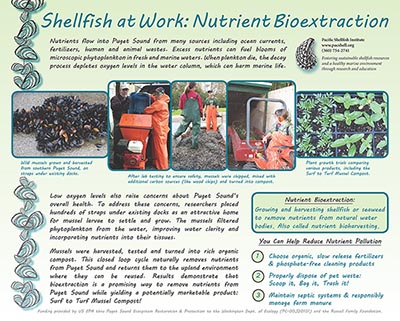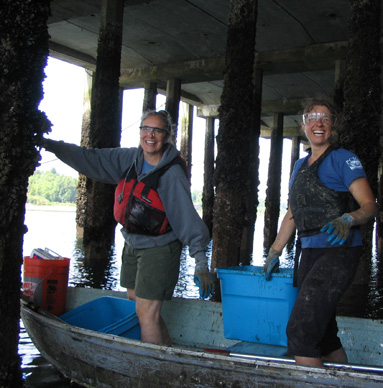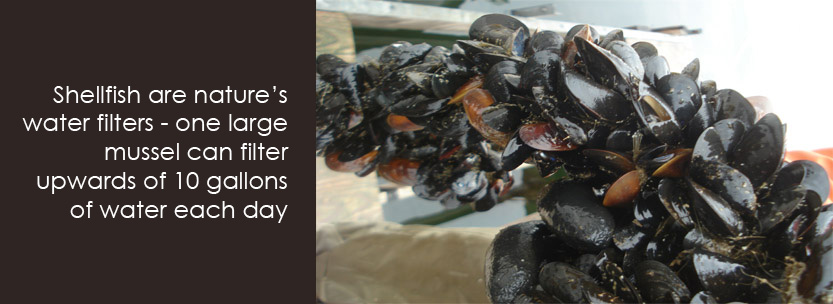|
Nutrient bioextraction is "an environmental management strategy by which nutrients are removed from an aquatic ecosystem through the harvest of enhanced biological production, including the aquaculture of suspension-feeding shellfish or algae" Nutrient removal by shellfish, which are then harvested from the system, has the potential to help address environmental issues in waterbodies including excess inputs of nutrients (eutrophication), low dissolved oxygen, reduced light availability and impacts on eelgrass, harmful algal blooms, and increases in incidence of paralytic shellfish poisoning (PSP). On average, a harvested mussel contains: 0.8 –1.2 % Nitrogen (N) and 0.06 –0.08 % Phosphorous (P). Removal of enhanced biomass (shellfish or algae) from impaired waters can combat problems associated with excess nutrients (eutrophication) while supporting the local economy by providing product for animal feed or compost. PSI and the Puget Sound Restoration Fund are beginning to investigate the potential use of mussels for nutrient mitigation in several locations in Puget Sound; Vashon Island, Tacoma, and Olympia’s Budd Inlet.
With these projects, PSI and partner organizations aim to demonstrate a creative strategy to reduce anthropogenic nutrient loads and support habitat renewal through the establishment of cost-effective, community-based bioextraction programs. These projects involve community members in the cultivation of a local species of bay mussel to quantify the nutrient sequestering abilities of this process and to demonstrate market-based mechanisms for removing and recycling excess nutrients (Nitrogen and Phosphorus) through the development of a high-value compost product. At the same time, these projects aim to increase public awareness of water quality issues including bacterial pollution, eutrophication, and harmful algal blooms and offer activities that empower citizens to envision a swimmable, fishable Puget Sound. Printable 1-page Summary
Detailed reports, including an executive summary, are available:
Surf to Turf Mussel Compost: Removing and Recycling Nutrients from Budd Inlet - Final Report (8 MB PDF, 5/2017)
Appendices (2.46 MB PDF, 5/2017)
Executive Summary (5/2017)
Shellfish at Work – Reducing Nutrient Pollution in the Budd Inlet Watershed - Final Report (2.2 MB PDF, 12/2014)
Appendices (4.4 MB PDF)


PSI Biologists Mary and Aimee scrape mussels from the Port of Olympia pier for nutrient bioextraction and composting trials in May 2016.
These projects were made possible through support from the Russell Family Foundation, King County, the Washington Department of Ecology, and the U.S. Environmental Protection Agency (EPA).
|
|
|













